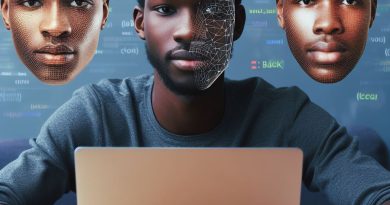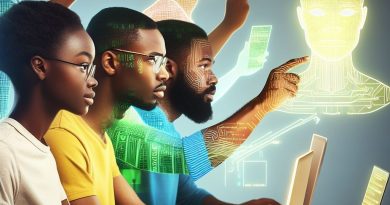Coding 101: What it Means and Why it Matters
Last Updated on October 16, 2023
Introduction
In our digitized world, to code stands as a fundamental skill. It’s not just for tech wizards; it’s an essential proficiency for anyone navigating the digital landscape.
In the next few paragraphs, we’ll unravel the mystery behind how to code, why it’s crucial, and how it influences our daily lives.
The Digital Era Unveiled
In the heart of our tech-driven existence, to code is the universal language, enabling the creation of websites, apps, and software.
From smartphones to social media platforms, coding powers our daily interactions.
The Rising Relevance
As industries intertwine with technology, coding proficiency becomes an asset.
It’s not confined to IT professionals anymore; marketers, artists, and scientists leverage coding for innovation. The demand for coding skills in the job market is soaring.
Understanding Coding
At its core, to code involves writing instructions that machines comprehend. It’s akin to composing a symphony of logic, where every line of code orchestrates a specific function.
To code is the bridge between human ideas and digital reality.
Why It Matters
- Innovation Catalyst: Coding fuels innovation, shaping groundbreaking technologies.
- Problem-Solving Tool: It equips us with problem-solving skills, fostering logical thinking.
- Digital Literacy: Understanding coding enhances digital literacy, empowering individuals in the digital age.
As we delve deeper into this blog, we’ll demystify the complexities of how to code, making it accessible and showcasing its transformative power in our lives.
Stay tuned for an enlightening journey into the world of how to code!
Understanding Coding
Coding is the process of writing instructions that computers can understand and execute. It is essentially giving commands to computers to perform specific tasks.
In simple terms, coding involves using a programming language to create a set of instructions that a computer can follow. These instructions can range from simple calculations to complex algorithms.
There are numerous programming languages used for writing code, each with its own syntax and purpose.
Some common programming languages include Java, Python, JavaScript, C++, and Ruby. Each language has its own strengths and weaknesses, making them suitable for different types of projects.
The Importance of Coding
Nowadays, coding has become an essential skill for various reasons:
- Career Opportunities: With technology playing a significant role in nearly every industry, coding skills open doors to a wide range of career opportunities from web development to data analysis.
- Critical Thinking: Coding helps build problem-solving and logical thinking skills as it requires breaking tasks into smaller steps to create a functioning program.
- Creativity and Innovation: Coding provides the ability to bring ideas to life by building unique software solutions or creating new technology.
- Automation and Efficiency: Through coding, repetitive and time-consuming tasks can be automated, allowing for greater efficiency and productivity.
- Collaboration: Coding often involves working in teams, encouraging collaboration, communication, and the sharing of ideas.
The Process of Coding
Coding follows a specific process that involves the following steps:
- Problem Identification: Clearly understanding the problem that needs to be solved and the expected outcome.
- Planning: Deciding on the best approach, breaking the problem into manageable parts, and designing the program’s structure.
- Writing the Code: Translating the planned design into actual code using the chosen programming language.
- Testing and Debugging: Running the code, identifying and fixing any errors or bugs that may arise.
- Refining and Iterating: Improving the code, optimizing performance, and making any necessary changes or updates.
- Deployment: Making the code available for use, either by compiling it into a standalone program or hosting it on a server.
The Continuous Learning Journey
Coding is an ever-evolving field, and as a coder, continuous learning is essential to stay up-to-date with the latest technologies and programming languages.
Learning resources such as online tutorials, bootcamps for learnig to code, and workshops can help beginners gain foundational knowledge, while experienced coders can explore advanced concepts through books, forums, and online communities.
Adopting a growth mindset and actively seeking challenges will contribute to skill improvement and a deeper understanding of coding concepts.
Writting code is the art of giving instructions to computers, allowing us to create software, solve problems, and shape the future of technology.
With the demand for skilled coders increasing, learning to code has never been more valuable.
Whether you aim to pursue a career in technology or simply want to enhance your problem-solving abilities, diving into the world of coding will empower you to think creatively, innovate, and make a meaningful impact.
Read: Case Study: Success Stories of Nigerian Coding Newbies
The Importance of Coding
Highlighting the Role of Coding in Technology and Innovation
Learning how to code is an essential skill that plays a crucial role in the advancement of technology and innovation.
It serves as the foundation for developing websites, apps, and software, enabling the creation of unique digital experiences.
Through code, complex algorithms are translated into a language that computers understand, allowing them to perform specific tasks efficiently.
As technology continues to evolve, writting code becomes increasingly valuable in driving innovation and pushing boundaries.
Empowering Websites, Apps, and Software
Coding is what powers the core functionality of websites, apps, and software, making them functional and interactive.
Web developers use programming languages like HTML, CSS, and JavaScript to design user-friendly interfaces and ensure smooth navigation.
Apps and mobile software rely on code to provide a seamless user experience, enabling features such as push notifications and offline capabilities.
Without proper coding, these digital platforms would not be able to deliver the functionalities we have come to expect.
The Essentiality of Coding in Digital Systems Creation and Maintenance
Coding is the backbone of digital systems, whether it’s building a simple website or developing complex software.
It is essential for creating and maintaining databases, ensuring accurate data storage and retrieval.
Coders work diligently to write efficient and error-free code to minimize system crashes or security vulnerabilities.
Regular updates and maintenance require coding skills to ensure the system remains secure and optimized for performance.
From e-commerce platforms to software-as-a-service solutions, coding is necessary for the smooth operations of digital systems.
The Impact of Learning to Code
Learning to code provides numerous benefits beyond understanding the technical aspects of programming.
It enhances problem-solving skills, logical reasoning, and critical thinking abilities.
Write code fosters creativity, allowing individuals to turn their ideas into tangible products and bring their visions to life.
Proficiency in writing code creates opportunities for career growth in various industries, as the demand for skilled developers remains high.
Moreover, learnig to code promotes collaboration and teamwork, as projects often require the combined efforts of multiple coders.
Writting code is not just a skill; it is a driving force that powers the technology we depend on today.
It empowers websites, apps, and software, enabling us to navigate, communicate, and access information seamlessly.
Moreover, coding is at the core of innovation and digital systems’ creation and maintenance.
Learning to code opens doors to endless possibilities and equips individuals with essential skills for the future.
So, embrace coding, dive into the world of programming, and witness firsthand the transformative impact it can have.
Read: Steps to Becoming a Full-Stack Developer in Nigeria

Why Coding Matters
Job Opportunities
Skilled coders are highly sought after in a wide range of industries. From software development to web design, there is a constant need for professionals who can understand, interpret, and write code.
This high demand translates into plentiful job opportunities for those with coding skills.
In addition to the abundance of job openings, coding-related fields also offer great potential for career growth and high salaries.
With the continuous advancement of technology and the increasing reliance on digital tools, professionals with coding skills are well-positioned for success in the future job market.
Problem-solving Skills
Coding is more than just writing lines of code. It teaches individuals logical thinking and problem-solving abilities.
As coders face various challenges and bugs while writing code, they develop the skills to break down complex problems into smaller, manageable components.
This logical approach to problem-solving is not only applicable in the coding world but also in many other areas of life.
Furthermore, coding equips individuals with transferable skills that can be applied in different contexts.
The ability to think critically, analyze data, and communicate effectively are all valuable skills that coding fosters.
These skills are highly sought after by employers across industries, making coding a versatile asset in today’s job market.
Creativity and Innovation
Coding allows individuals to unleash their creativity and bring their ideas to life through technology.
With the right coding skills, anyone can develop their own mobile application, build a website, or design interactive games.
This freedom to create has revolutionized industries such as entertainment, communication, and education.
Moreover, coding has had a profound impact on society as a whole.
Through innovative technological advancements, coding has improved the way we work, communicate, and access information.
From self-driving cars to artificial intelligence, coding has the power to shape the future and drive positive change.
Coding is not just a technical skill; it has become an essential tool for success in the digital age.
The high demand for skilled coders, the development of problem-solving skills, and the opportunity to unleash creativity and innovation all make coding matter.
Whether you are looking for job opportunities, seeking personal growth, or aiming to make a difference in society, learning to code is a path worth exploring.
Read: Essential Coding Tools for Beginners: A Nigerian’s Guide
Getting Started with Coding
If you’ve ever been intrigued by the world of writing code but didn’t know where to start, you’re in the right place.
Writting code, in simple terms, is the process of creating instructions for computers to execute tasks. In this blog chapter, we’ll guide you through the initial steps of becoming a coder.
Suggest Resources and Platforms for Beginners to Learn Coding
When it comes to learning how to write code, there is no shortage of resources available. Here are some popular platforms and resources that can help beginners kickstart their journey in writting code:
- Codecademy: Codecademy provides interactive lessons to code across various programming languages.
- freeCodeCamp: freeCodeCamp offers a comprehensive curriculum and challenges for beginners to code.
- Coursera: Coursera hosts coding courses taught by professors from renowned universities.
- Udemy: Udemy offers a wide range of coding courses created by industry professionals.
These platforms provide structured learning paths and interactive exercises, making it easier for beginners to grasp the concepts of writting code.
Online Coding Courses, Tutorials, and Coding Bootcamps
If you prefer a more guided or immersive learning experience, online courses for writting code, tutorials, and how to code bootcamps might be the right choice for you.
Online courses for how to code, such as those offered by Udacity and edX, provide in-depth lessons and projects to help you build practical skills.
Tutorials available on websites like W3Schools and Mozilla Developer Network are also great for learning specific programming languages and web development.
Bootcamps to code, on the other hand, are intensive and immersive programs designed to equip you with the skills to write code in a short period of time.
They often offer a curriculum focused on real-world projects and mentorship from experienced developers.
Encourage Readers to Start with Simple Coding Projects and Gradually Progress
When you’re just beginning your journey in learning how to code, it’s essential to start with simple projects and gradually increase the complexity as you gain more experience. Here are some project ideas to get you started:
- Create a basic HTML webpage with CSS styling.
- Build a simple calculator using JavaScript.
- Develop a to-do list application with basic CRUD (Create, Read, Update, Delete) functionality.
- Design a responsive website layout using Bootstrap framework.
- Create a basic mobile app interface using Flutter or React Native.
By starting small, you’ll build a strong foundation and gain confidence in your abilities to write good code.
As you complete these projects, challenge yourself with more advanced concepts and explore different programming languages and frameworks.
Coding is a skill that can open doors to a wide range of opportunities in today’s digital world. It’s never too late to start learning and exploring the exciting realm of writing code.
So, pick a platform, choose a project, and embark on your journey of writing code today!
Read: How Coding Can Help Solve Nigeria’s Unemployment Crisis
Conclusion
Learning to code plays a vital role in various aspects of modern life. From the technology we use daily to the medical advancements saving lives, coding is everywhere. Its impact is undeniable.
We should not shy away from learning to code but instead embrace it. By learning to code, we can tap into its endless potential. We can create, innovate, and solve problems in ways we never thought possible.
So, I encourage you, dear reader, to take the leap and explore the world of writing code. Start by signing up for courses to code or joining communities to learn to code.
There are plenty of resources available online to help you get started.
By learning to code, you can unlock a whole new world of possibilities. You can develop apps, build websites, or even pursue a career in tech.
The opportunities are endless, and the rewards can be immense.
Now is the time to dive into this exciting field. Don’t let the perceived complexity or intimidation hold you back. Coding is for everyone, and it is an essential skill for the future.
So, what are you waiting for? Start your coding journey today. Sign up for a course, connect with fellow coders, and unleash your creativity.
Coding is not just a technical skill; it is a way of thinking that can transform your life and make a difference in the world.


